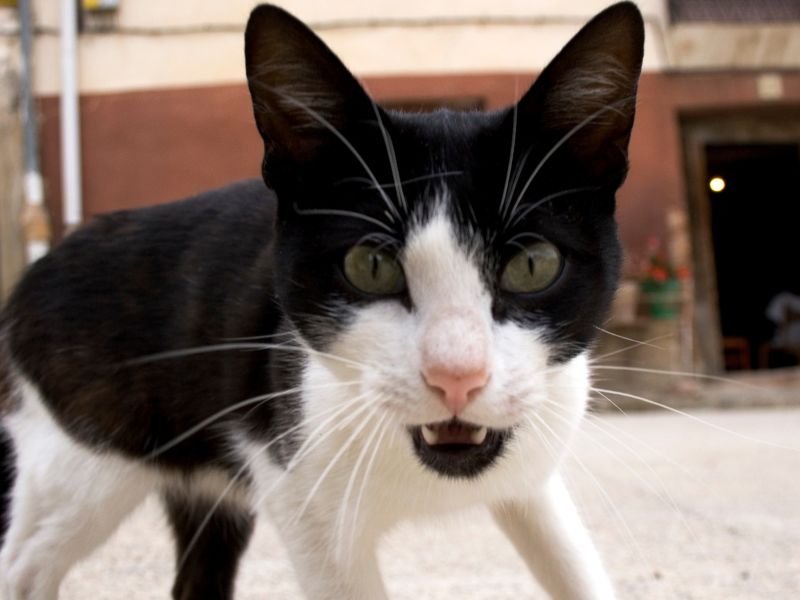Cats and dogs are territorial creatures. The first one there no doubt thinks of the household as their sole territory, and they want to defend that territory from trespassers or interlopers.
If the cat was your sole pet until you brought a dog home, then the cat will see the dog as an interloper and do what it instinctively can to defend its territory. This may include hissing and spitting at the dog, and even physically attacking the dog until the cat has asserted dominance and even driven the dog away. Such behaviour is unacceptable in a home, and some cats and dogs can live together and be friends, so what is the problem here?
Perhaps you have introduced your new dog to the family too quickly. A newcomer is best introduced slowly over a period of time. Keep them separate, but able to see and sniff each other, but with a safe distance between them and both supervised so one can be taken from the room quickly if one of them is aggressive from the start.
Over time, once both pets know the other is also a resident of the household, they will either begin to accept each other’s presence and live in peace, or they may totally ignore each other, but are able to abide in the same room without conflict.
A great deal of patience is required here for this to work, but it will be worth it in the end if both cat and dog can live together and can be left safely in each other’s company with you worrying about hostile behaviour from one or the other and coming home to a battlefield.
Why Does My Cat Hiss at My Dog?
Although your cat and dog may be eventually able to live together, they may never become friends. It may take a long time for that to happen. Meanwhile, the cat may accept the dog under the same roof, and even in the same room, but the cat may still have boundary issues, and if the dog moves too close, the cat may exert some threatening behaviour that will usually start with hissing at the dog. If the dog retreats, this may not escalate and sooner or later the dog will learn keeping a safe distance from the cat is the best for them and the peace of the household. If the dog does retreat, then reward it for showing sensible behaviour and the dog will be more likely to follow the path of least aggression in future. If the dog responds to the cat with equally aggressive behaviour, you may have to separate them and begin again the process of slow integration so they can hopefully learn to live with each other.

Can A Cat Hurt a Dog?
In extreme cases a cat can hurt a dog, but this depends on a range of factors. The main one being the size of the cat and the size of the dog. A cat will be unlikely and unwilling to attack a dog that is much bigger than it. Cats are not stupid, they know attacking another animal may lead to retaliation, and retaliation from a larger foe may be folly and a costly mistake if the cat is injured. Nevertheless, a cat has claws and teeth and both can be used in a fight if the cat deems attack is the best way to exert dominance.
Sometimes, much of a cat’s behaviour depends on how the dog will react to the cat. If the dog is subservient, then generally the cat will leave it alone as long as it keeps a distance. If the dog responds to the cat’s aggression with aggressive behaviour of its own, then it may lead to a fight until one exerts dominance and the other submission.
How Do I Get My Cat To Be Nice To My Dog?
Your cat may resent your dog for several reasons and the cat’s mean behaviour towards the dog may be as a result of how they were first introduced to each other. For them to live together in harmony, both have to feel loved and secure and unthreatened in the home. If the cat is jealous of the dog, or feels the dog is trespassing its territory, then the cat will feel justified in being mean to the dog.
Introducing the new comer slowly, in stages, in a controlled environment is the way to go. Show each pet equal love and attention so the cat will not feel jealous or resentful, or feel in any way it is being replaced. Begin with the cat and dog in separate rooms until they become accustomed to each other’s presence and smell. Reward both regularly for good behaviour, especially when they begin to learn to be around each other in the same room. If any hostility is shown by the cat, or the dog, then revert back to separate rooms once more for a time. Patience is the key, and eventually over time, both the cat and dog may learn to trust each other without one feeling threatened by the other. If the cat doesn’t feel threatened or jealous of the dog, then it should begin to get along, or at least be indifferent to it. At this stage though, it should stop being deliberately mean to the dog.

See Also: Can I Stop My Dog Chasing Cats?
And: Are Feral Cats Bigger Than Domestic Cats?
How Do You Discipline a Cat for Attacking the Dog?
Encouraging good behaviour is the best form of discipline. For example, if your cat attacks your dog, then take the cat into another room and leave it there for a time. If your cat accepts the dog in the same room without showing hostility, then reward it with some extra attention and praise, or a treat. Sooner or later the cat will come to understand that not being mean to the dog, or attacking the dog, will lead to being rewarded with praise or a treat, or extra play time with a toy.
Don’t ever physically punish the cat. Any violence toward the cat will only make it anxious and fearful, and may be counter productive as the cat may see the bond between you and the cat as irretrievably broken, and begin to view you as someone who inflicts pain rather than someone who shows love and affection.
If you feel you’ve done all you can and your cat still shows aggression towards your dog, then seek out some professional advice from a vet or an animal behaviour specialist. There may be an underlying cause for your cat’s behaviour that if discovered can be remedied quickly.
With patience and understanding, love and attention, and praise and treats, eventually your cat and dog should be able to live in harmony in the same house. They may never become great friends, but toleration of each other rather than hostility means a calmer and more peaceful environment. They may each surprise you by becoming close friends after a time, stranger things have happened!
Featured image: Headshot of an Aggressive Cat

